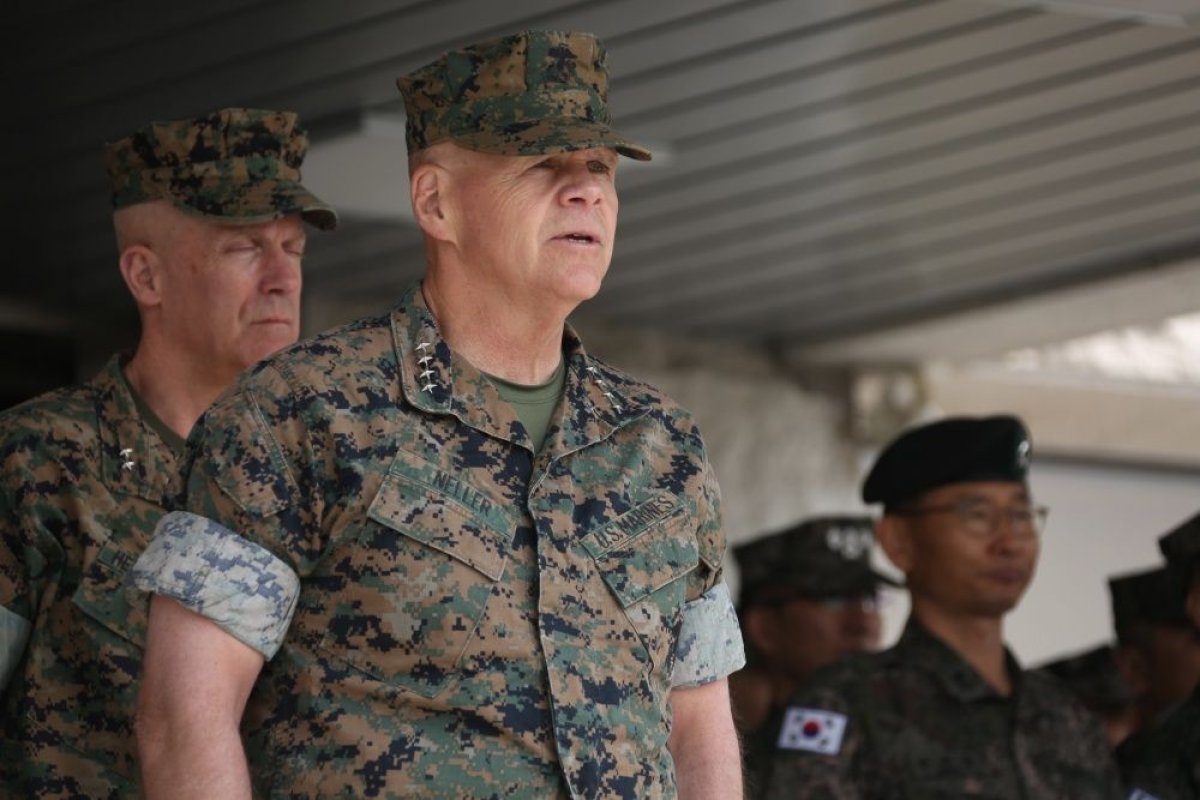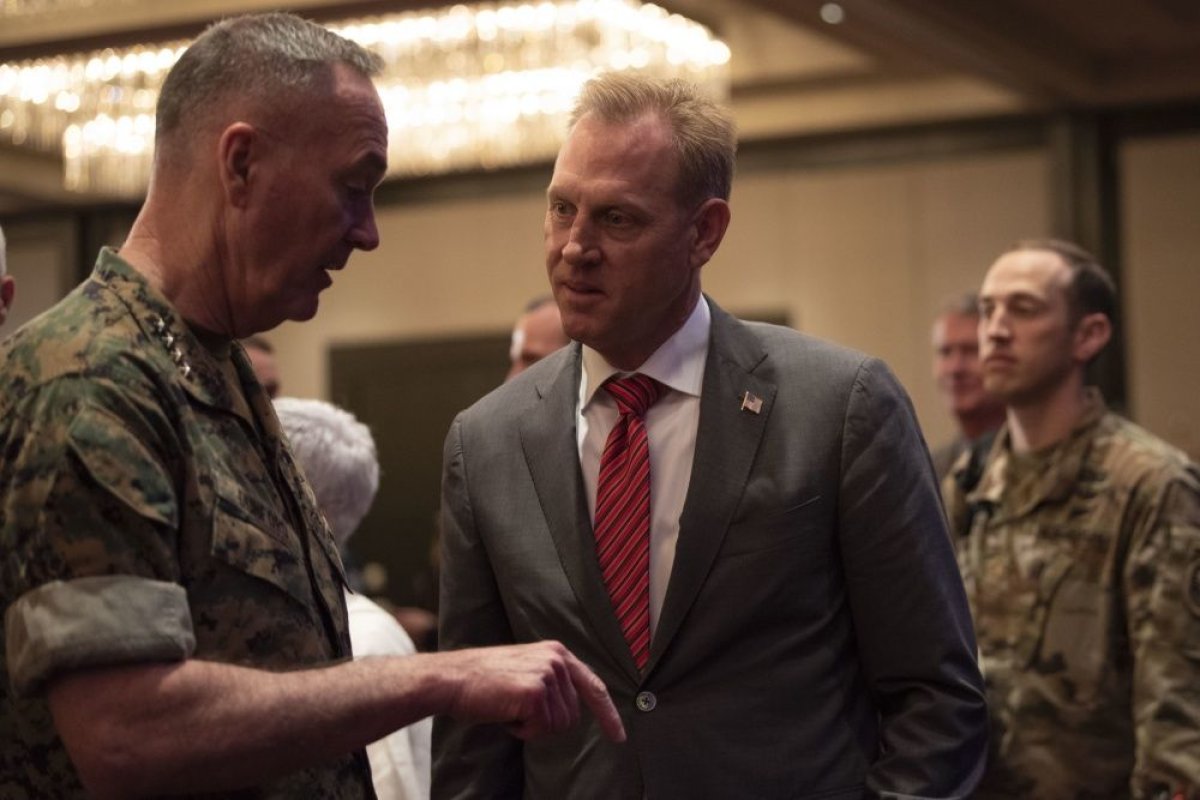The Marines' top general allowed internal memos to leak out of the Pentagon to bring attention to service families living among hurricane-ravaged military installations as the Trump administration tries to bankroll the southwest border with defense funds at the expense of combat readiness.
General Robert Neller, the commandant of the Marine Corps, let two internal Defense Department memorandums leak to The Los Angeles Times and NBC News in the past two weeks, two Pentagon sources, who asked not to be named due to U.S. military media regulations, told Newsweek.
The letters underscore the fiscal challenges the service is facing as it struggles to support security operations at the southwest border while "unplanned/unbudgeted" line items plague the general's fiscal agenda, a burden Neller asserts is an "unacceptable risk to Marine Corps combat readiness and solvency."
When asked why Neller would allow internal memorandums to leak to press outlets, one Defense Department source expressed bluntly, "Because he didn't want the Marines and families at Camp Lejeune [in North Carolina] to get f***ed."
Six months after Hurricane Florence first made landfall at Wrightsville Beach in North Carolina, roughly an hour southwest of Camp Lejeune, the base is still waiting on funding for repairs.
In Neller's letters, unexpected service spending bills, including for President Donald Trump's southwest border operations, left the Marine general no choice but to cancel or significantly drawback planned military training exercises. The Marine commandant canceled the Integrated Training Exercise, known to Marines as ITX, for II Marine Expeditionary Force. ITX is a large-scale, combined-arms training exercise in the Mojave Desert at the Marine Corps Air Ground Combat Center in Twentynine Palms, California.
Exercises Northern Edge, the Marines joint exercise with allied partners aimed at preparing combat forces for operations in the Indo-Asia-Pacific region were significantly reduced, among other canceled or scaled-back training drills.

"The combat readiness of II Marine Expeditionary Force—1/3 the combat power of the Marine Corps—is degraded and will continue to degrade given current conditions," Neller wrote in the letters obtained by Newsweek and first reported by The Los Angeles Times.
Newsweek previously reported that Trump took Defense Department officials by surprise when he first ordered U.S. troops to the southwest border last fall. Senior-level officers at the Pentagon said they believed the president's move was politically motivated, due to the mobilization of military units coming less than a week before the midterm elections.
Pentagon officials speaking to Newsweek last year ridiculed the deployments as a significant waste of taxpayer dollars with the operations themselves running counter to military readiness.
In the early days of the deployment, initially dubbed Operation Faithful Patriot, Camp Pendleton, the largest Marine base on the West Coast, was used to support elements of Task Force 51, the name given to U.S. Army North's homeland defense command. Marines at Pendleton supported military operations in collaboration with U.S. Customs and Border Protection at the port of entry in San Ysidro, a district in San Diego.
Contacted by Newsweek, Marine Colonel Riccoh Player said, "General Neller provides direction and actions on a host of issues from Marines United, to consistent opposition to sexual assault, to advocacy for the victims of same, to efforts promoting diversity in the Corps, to funding for Camp Lejeune Housing. The memo between Acting Defense Secretary Patrick Shanahan and the CMC was private."
"The CMC Staff does not catalog every private memo the CMC shares, nor can the staff prevent people from leaking documents," Player added. "Finally, the Marine Corps is self-funding recovery efforts for repairs aboard Camp Lejeune, but any additional funding remains to be determined by Congress."
The Marine commandant is in his final year as commandant and will retire later this year to make way for Marine Lieutenant General David Berger, who's nomination went to the U.S. Senate last week. If confirmed by Congress, Berger will receive his fourth star and serve a four-year term as the top general of the Marine Corps—the Defense Department's smallest branch.
Neller wrote the letters to Acting Defense Secretary Patrick Shanahan and Navy Secretary Richard Spencer in February and March of this year and said Hurricane Florence inflicted, "extensive damage to 913 military structures; 3,748 homes; infrastructure to include railways, roads, and the power grid; and to training areas," across three different Marine Corps installations in North Carolina.
Hurricane Florence struck the Outer Banks of North Carolina in mid-September last year as a Category 1 storm and caused more than $17 billion in damage across the Tar Heel state.
Neller told Spencer the total damage costs was estimated at $3.5 billion, with $1.3 billion in building repairs and $1.7 billion in building replacements. The other $500 million would be allocated to operations and maintenance costs and the replacement of information infrastructure and end items. An additional $47 million would go to Marine Corps Base Albany after they suffered building damage after Hurricane Michael impacted Georgia.
Asked about the situation at Camp Lejeune, Marine Colonel Brian Wolford told NBC News "We're 100 percent operational. We're here doing our work, but the conditions we're working under are just like when we were in Iraq or Afghanistan."
Congressional Democrats in the House repeatedly cited Neller's letters last week on Capitol Hill as Pentagon officials rolled out the Defense Department's budget for fiscal year 2020. Lawmakers used the memos to reinforce their arguments against shifting Defense Department funds to aid in the construction of President Donald Trump's border wall.
U.S. Marine General Joseph Dunford Jr., the chairman of the Joint Chiefs of Staff, tried to clarify Neller's letters when he told Congress last week the Marine commandant was listing the number of "unanticipated bills" the service was on the hook for paying in the current fiscal year, among them, the "unplanned/unbudgeted Southwest Border Operations." Dunford said Neller did not specifically single out border deployments.
"This particular letter did not single out the southwest border deployment as being the issue, it identified the southwest border as one of the "unanticipated bills," Dunford told Democratic Congressman Gil Cisneros of California.

Congressional lawmakers shot down a Pentagon request to shift $1 billion from a military personnel account to fund Trump's southern border wall.
The billion dollars in funding became available for use after service branches failed to meet their recruiting goals, said Defense Department officials. President Trump's declaration of a national emergency back in February cleared the way for funds to be reallocated to the border.
House Armed Services Chairman, Democratic Representative Adam Smith of Washington State, wrote in a letter to the Pentagon: "The committee does not approve the proposed use of Department of Defense funds to construct additional physical barriers and roads or install lighting in the vicinity of the United States Border."
Lawmakers of both parties have warned Pentagon officials they may be compelled to cut off the Pentagon's ability to move money within its budget if they do not seek congressional approval to transfer funds beforehand. Smith said the Defense Department did not ask permission.
Monica Matoush, the communications director for the House Armed Services Committee, told Newsweek Smith was troubled by the multiple pleas made to the secretary of the Navy and the acting secretary of Defense for their immediate assistance in staunching current readiness risks and long-term damaging impacts to "Marine Corps combat readiness and solvency."
Matoush said the Marines budget crisis for the current fiscal year is partially to blame on the inaction of the Defense Department and the Trump administration's border deployments and emergency declaration.
"There is an emergency when it comes to the readiness of our Marine Corps, that is where we need to focus our resources," said Matoush.
Shanahan, the acting defense secretary, said they were given "a legal order from the commander in chief," and the U.S. military was executing the president's order. Shanahan added that the Pentagon was aware of the financial pitfalls and the risk of losing the authority to reprogram funds.
Last week, the Pentagon responded to the House Armed Services Committee's authorization denial to shift $1 billion to help fund security measures and the border wall: "When the Department seeks committee approval, it does so as a matter of comity, not because it is required by law."
After this story published, Newsweek received a statement Wednesday evening from U.S. Navy Secretary Richard V. Spencer, the top civilian leader overseeing both the Navy and Marines Corps services. Spencer said the Neller memos were apart of private working documents created to assess budget issues and Neller himself assured the secretary he did not leak the memos or direct others to do so.
"As previously stated, as part of normal business operations, I regularly ask the Commandant for comprehensive descriptions of budgetary pressures currently facing the Marine Corps. This working memo was sent to support the Department of the Navy's assessment into how to best understand current cash flow implications," Spencer said. "Memos referenced in this article were sent to me as private working documents. I have personal assurances from the Commandant that he did not leak the memo himself, or direct or otherwise encourage any member of the Marine Corps or his staff to do so."
Update: This article has been updated with a statement from U.S. Navy Secretary Richard V. Spencer.
Uncommon Knowledge
Newsweek is committed to challenging conventional wisdom and finding connections in the search for common ground.
Newsweek is committed to challenging conventional wisdom and finding connections in the search for common ground.
About the writer
James LaPorta is a senior correspondent for Newsweek covering national security and military affairs. Since joining the magazine, Mr. LaPorta has extensively ... Read more
To read how Newsweek uses AI as a newsroom tool, Click here.








